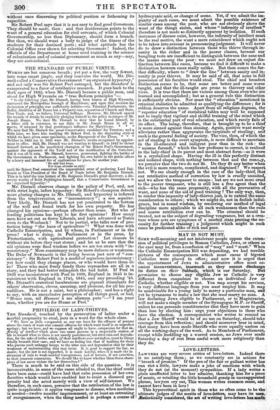THE STANDARD OF PUBLIC VIRTUE.
WORDS are but sonorous breath ; yet put a few, the very fewest, into some smart jingle, and they convulse the world. Mr. Dis- raeli called a Conservative Government "an organized hypocrisy," and not only was Sir Robert Peel outraged, but the Standard is exasperated to a furor of retributive research. It goes back to the dark ages of 1832, when Mr. Disraeli became a public man, and stood for High Wycombe on "true Reform principles "— " In the following year, Mr. Disraeli, having been beaten at High Wycombe, canvassed the Metropolitan borough of Marylebone ; and upon this occasion his declaration of principles was sufficiently definite—viz. Triennial Parliaments, the Ballot, Abolition of all Taxes but a Property-tax, separation of Church and State, Free Trade, and, we believe, Universal Suffrage. However, Mr. Disraeli spared the trouble of details by explicitly pledging himself to the policy in integro of Mr. Joseph Hume. We dare Mr. Disraeli to deny that he bound himself, by a letter still in existence, to say ditto to Mr. Joseph Hume in all re- ects, if returned by that gentleman's influence for Marylebone. • • * We next find Mr. Disraeli the quasi Conservative candidate for Taunton; and a little later, we have him toadying Sir Robert Peel, in the disgusting style of which we have given some specimens, as the Runnymede of the Times. * • • Neither in 1835 nor in 1841 were Mr. Disraeli's merits recognized by appoint- ment to office. Still, Mr. Disraeli was not wanting to himself: in 1842 he thrust himself forward, as the unsolicited champion of Sir Robert Peel's Government, against the opponents of the Tariff and of the modification of the Corn-law; but it was all in vain. Mr. Disraeli, however, persevered, fighting the battles of the Government in Parliament, and fighting his own battle in the public offices by a heavy and incessant fire of applications for place, for another year.
'He still had hope, For hope attends us still,' until Sir Robert Peel committed the unparalleled error of preferring Lord Dal- housie as Vice- President of the Board of Trade before Mr. Benjamin Disraeli. This is in brief the true history of Mr. Benjamin Disraeli's great discovery, a dis- covery worthy of Bubb Doddington himself; that a Conservative Government is an organized hypocrisy.'"
Mr. Disraeh observes change in the policy of Peel, and, not with strict logic, infers hypocrisy: Sir Robert's champion detects more glaring changes in Mr. Disraeli, and hypocrisy is inferred from the tergiversation or " inconsistency " ; a non sequitur. Very likely, Mr. Disraeli has not yet penetrated to the bottom of the well and found truth. for his own property. He has changed his opinions—perhaps oftener than some. But who of leading politicians has kept to his first opinions? How many men have set out as fierce Liberals, and have advanced as Tories even to the Woolsack ? Not to be partial, who talks now of pro- tection being "the bane of agriculture"? 'What was done with Catholic Emancipation, and by whom, in Parliament or in the press? what is doing, in Parliament or in the press, by Protectionists, with agricultural protection ? Let censors be without sin before they cast stones ; and let us be sure that the old opinions wee final wisdom before we are too stern with "in- consistency." Mere consistency may be mere dulness or weakness. The Duke of Newcastle' is the living beacon just now of " con- sistency" : Sir Robert Peel is a model of sagacious inconsistency : yet how could they change places, or who would have them do so! Those who most freely bandy these reproaches are all in a story, and they had better relinquish the bad habit. If Peel in 1829 was inconsistent with Peel in 1828, England in 1845 is in- consistent with England in 1745, 1645, and any preceding '45. Mr. Disraeli's oratorical lucubrations are jiiquant stimulants for others' observation, clever, amusing, and" pleasant, for all his pec- cadilloes. He is not a saint, but a philosopher; and has a right to say, with an unexclusive perception of all things good, or bad, "Homo sum, nil Hurnani a me alien= puto "—" I am your man, whether you are for Hume or Peel."


























 Previous page
Previous page